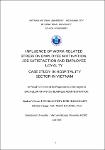| dc.description.abstract | As Viet Nam is becoming an attractive destination, captivating a strong flow of tourists every year and is one of the 10 countries with the highest growth rate of international visitors in the world, the hospitality industry has been becoming popular and plays an important role in the Vietnam market in recent years. Many previous studies have investigated the effects of employee motivation and job satisfaction on employee loyalty. However, there is a lack of researches that provides a complete research model and deeper insights into the employee’s well being, especially in the Hospitality context. Therefore, this study suggests a comprehensive model, comprising the effects of work-related stress; particularly, two main job stressors are examined in this study; namely, job-related stressors and individual-related stressors on employee motivation, job satisfaction and employee loyalty. Moreover, this study aims to investigate this issue in the context of Vietnam Hospitality for employee perspectives. First, this research aimed to explore and provide insights into job stress, employee motivation, job satisfaction and employee loyalty factors from previous studies and theories. Second, the proposed research framework is determined in the Hospitality sector in Vietnam. Survey method is adopted in this study for data collection process with 595 participants including Hotel/Restaurant receptionists, low-level managers (shift/group leader, supervisor, etc.) and Middle level and high ranked managers (Chief/deputy chief of department, general manager, director, etc.) from medium to large Hotels and Restaurants in Ho Chi Minh City. Besides, the collected data are analyzed by employing the Partial Least Squares (PLS) technique. Then, it attempts to investigate the relationships between work-related stress, employee motivation, job satisfaction and employee loyalty. According to the findings in this study, individual-related stressors have significant direct effects on employee motivation, job satisfaction and employee loyalty. While job-related stressors only directly affect employee motivation; however, indirect effects on job satisfaction and employee loyalty were also determined. Moreover, the significant effects of employee motivation and job satisfaction on employee loyalty are also determined in this research. The results support 10 out of 14 hypotheses and uncover the key findings on how employees feel motivated, satisfied with their jobs and become loyal to the organizations. Finally, this study provides critical contributions to the research field of the Hospitality industry as well as suggests some important recommendations for improving employee motivation, job satisfaction and employee loyalty in the context of Vietnam Hospitality. | en_US |


